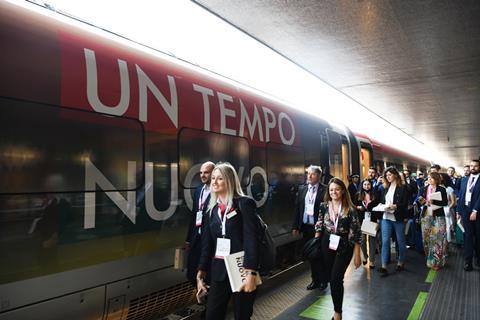
ITALY: New organisational and governance structures and a focus on sustainability are the centrepieces of a €190bn business plan for 2022-31 unveiled by national railway FS Group.
Presented in Roma on May 17 by FS Group Chairwoman Nicoletta Giadrossi and CEO Luigi Ferraris under the slogan ‘Un Tempo Nuovo’, the 10-year plan aims to prioritise multimodal public transport over private transport, and to double rail freight’s market share compared with 2019.
Group revenues are projected to grow at a cumulative annual average of 6·9% over the plan period to around €22·5bn in 2031, with EBITDA increasing at a CAGR of 8·2% to €3·9bn.
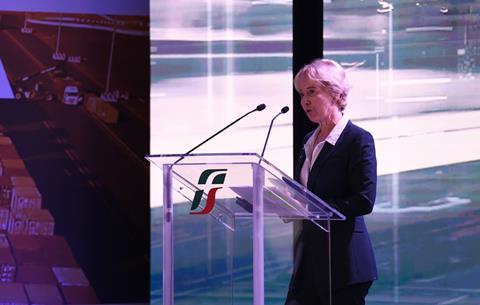
The planned spend of €190bn is more than double the €94bn envisaged in the group’s last 10-year strategic plan for 2017-26, which was unveiled in September 2016, but subsequently replaced by a four-year business plan for 2019-23 valued at €58bn.
In its 2022-31 plan, FS Group intends to make more use of renewable energy sources and contribute to an ‘ecological transition’ as part of the country’s efforts to minimise climate change. Strategic initiatives will look to increase the degree of energy autonomy, and Ferraris said FS was looking at ‘self-producing at least 40% of our substantial energy needs from renewable sources’.
In terms of infrastructure, ‘the goal of the 2022-31 Business Plan is to accelerate investments and provide more certainty that works will be completed on schedule, thanks to a long-term vision’, Ferraris explained. ‘We are working to make our infrastructure more modern, interconnected and resilient, and our mobility services tailored to the different needs of our customers. We intend to promote a multimodal, collective transport that is more sustainable even in urban areas.’
In the international arena, another strategic initiative envisages that FS Group will assume ‘sole control’ over its various businesses ‘to generate further value’ in those countries where it is already active: France, Spain, Germany, Greece, the Netherlands and the UK. Several of these are currently run as joint ventures or partially owned by local partners. Further afield, it plans to export ‘integrated know-how’ outside Europe through partnerships.
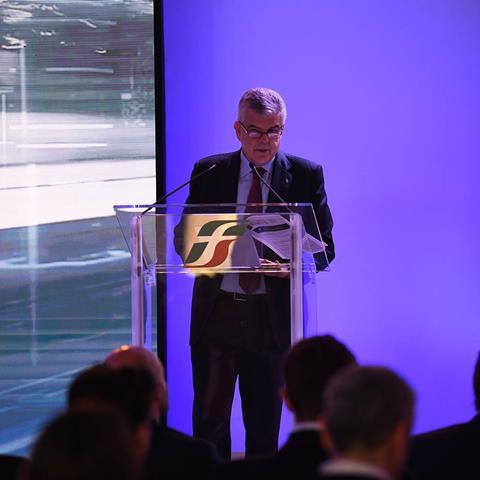
Emphasising that the key factors for successful implementation of the plan included innovation, digitisation, connectivity and staff development, Ferraris said the group was looking to recruit around 40 000 people over the course of the decade. ‘A new, promising era is beginning for us all, and I am certain that our people, today as yesterday, will know how to turn this plan into reality, proving themselves equal to the challenges that await us’, Ferraris concluded.
Pole by pole
A major reorganisation will see the group’s principal subsidiaries and operating businesses grouped into four new ‘poles’ dedicated to Infrastructure, Passengers, Logistics and Urban.
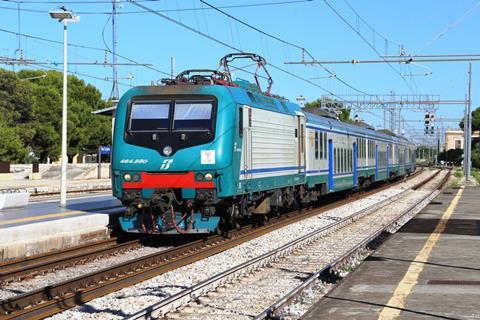
To be headed by RFI CEO Vera Fiorani, the Infrastructure pole will bring together Rete Ferroviaria Italiana, road agency Anas, technical consultancy Italferr and the infrastructure part of Ferrovie del Sud Est, in order to ‘create sustainable, accessible, integrated and interconnected road and rail works’.
The plan envisages that rail and road infrastructure should become more ‘sustainable, accessible, integrated and resilient’, and the network is to be expanded to reduce the economic gap between north and south; FS will also seek to ensure that infrastructure works are completed on schedule. Around €160bn is to be invested in infrastructure over the 10 years, with €110bn for rail and €50bn for the road sector. There will be a special focus on network development, maintenance, safety and technology.
Seamless mobility
The Passenger hub brings together operators Trenitalia, Trenitalia Tper, Busitalia and Ferrovie del Sud Est with a view to developing a more multimodal offering that would make public transport more attractive than private travel.
This would be ‘supported by digital technologies and commercial synergies capable of offering integrated and sustainable mobility services from the first to the last mile’.
The various operators carried a total of 477 million passengers in 2021, but FS Group aims to increase public transport’s market share by 9 percentage points over the next decade and increase turnover by 37%. This would require investment of an estimated €15bn.
Multimodal initiatives will include greater fare integration, enabling passengers to travel on several modes with a single ticket, and better co-ordination of timetabling to provide enhanced connections, supported by digital information services.
This includes the development of Busitalia Rail Service, which manages road services in support of rail transport, as well as the expansion of FrecciaLink and Link connections, which augment the network of long-distance and regional trains with integrated train, bus and ferry services. FS Group says it is working on ‘a customised, customer-centric offer, capable of satisfying the mobility needs of commuters, tourists and those travelling for work or leisure’.
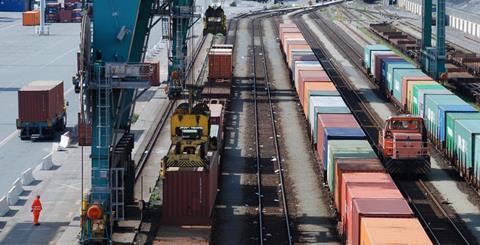
Doubling market share
Led by FS Group’s Chief International Officer Carlo Palasciano and Mercitalia Logistics CEO Gianpiero Strisciuglio, the Freight pole will bring together six national and international operating companies: Mercitalia Logistics, Mercitalia Rail, TX Logistik, Mercitalia Intermodal, Mercitalia Shunting&Terminal and Terminal AlpTransit.
Although Mercitalia handled 43 million tonnes in 2021, FS Group says rail’s share of the freight market is currently 11%, which is well below the European average of 18%, the 35% achieved in Austria or 46% in the USA. The objective of doubling that share means ‘working from a system perspective on the entire supply chain’ with around €2·5bn to be invested in new and improved terminals along with ‘digitalisation of the freight transport chain’.
As well as five new terminals in Milano, Brescia, Piacenza, Bari and München, the group will put into service around 400 locomotives and 3 600 digitally-enabled wagons to help renew the rolling stock fleet.
Urban development
The Urban pole is to be established with a remit to develop the infrastructure needed ‘to ensure increasingly intermodal and environmentally sustainable travel within cities’, and to make stations more attractive and accessible, so that they can function as ‘true hubs of shared mobility’. It will also oversee the various partnerships between FS Group and local car and bike sharing services to support last mile connectivity.
The pole will operate an estimated 250 car parks on FS land, including a new multi-storey facility at Napoli Centrale which is to be fitted out as a hub for green mobility, offering car sharing services and electric vehicle recharging points.
Noting that Italy’s large cities are responsible for 40% of energy use and 70% of greenhouse gas emissions, FS Group says it has around 30 million m2 of land available around stations, roads and railways that can be used for clean energy, green corridors, cycle paths and rest areas.
It is looking at ‘the virtuous reuse of disused assets’, citing the redevelopment of seven disused railway yards in Milano for sustainable urban development including the 2026 Olympic village and zero-emission social housing, as well as a large public park. Across the country, an estimated 418 disused station buildings will be loaned to local authorities and non-profit associations for public, charitable and tourist purposes.
The plan also provides for the development of centres of excellence offering turnkey services to small and medium-sized cities of between 100 000 and 400 000 inhabitants.

















